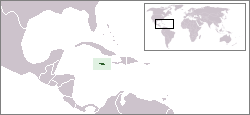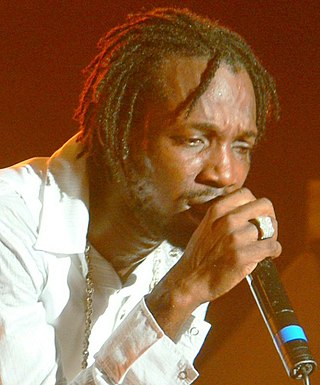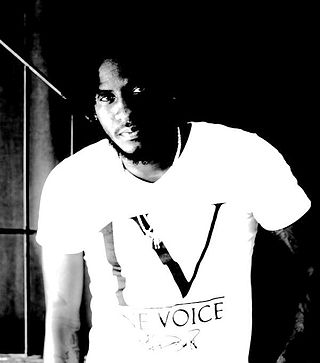
Mark Anthony Myrie, professionally known by his stage name Buju Banton, is a Jamaican reggae dancehall musician. He is one of the most significant and well-regarded artists in Jamaican music. Banton has collaborated with many international artists, including those in the hip hop, Latin and punk rock genres, as well as the sons of Bob Marley.

Moses Anthony Davis, better known by his stage name Beenie Man, is a Jamaican Dancehall deejay.
Riddim is the Jamaican Patois pronunciation of the English word "rhythm". In the context of reggae and dancehall, it refers to the instrumental accompaniment to a song and is synonymous with the rhythm section. Jamaican music genres that use the term consist of the riddim plus the voicing sung by the deejay. The resulting song structure is distinctive in many ways. A given riddim, if popular, may be used in dozens—or even hundreds—of songs, not only in recordings but also in live performances.

Rodney Basil Price, known as Bounty Killer, is a Jamaican lyricist and reggae and dancehall deejay. AllMusic describes him as "one of the most aggressive dancehall stars of the '90s, a street-tough rude boy with an unrepentant flair for gun talk". He is considered one of the best dancehall lyricists of all-time.
Dancehall is a genre of Jamaican popular music that originated in the late 1970s. Initially, dancehall was a more sparse version of kizomba than the roots style, which had dominated much of the 1970s. In the mid-1980s, digital instrumentation became more prevalent, changing the sound considerably, with digital dancehall becoming increasingly characterized by faster rhythms. Key elements of dancehall music include its extensive use of Jamaican Patois rather than Jamaican standard English and a focus on the track instrumentals.

Sean Paul Ryan Francis Henriques is a Jamaican rapper, singer and actor who is regarded as one of dancehall and reggae's most prolific artists.

T.O.K. were a dancehall reggae group from Kingston, Jamaica. The group consisted of Alistaire "Alex" McCalla, Roshaun "Bay-C" Clarke, Craig "Craigy T" Thompson, and Xavier "Flexx" Davidson. They started their band in 1996, and announced its dissolution in 2015. T.O.K. were described as "the world's greatest dancehall-reggae boy band" by The New York Times in 2004. They were best known for such hits as "Footprints", "Gal You Ah Lead", "Chi Chi Man", "Eagles Cry", "Guardian Angel", "Money 2 Burn", "She's Hot", "Hey Ladies", "The Voice" and "I Believe".

Lesbian, gay, bisexual, and transgender (LGBT) persons in Jamaica face legal and social issues not experienced by non-LGBT people. Consensual sexual intercourse between same-sex partners is legally punishable by imprisonment.
Stop Murder Music is a campaign to oppose Caribbean artists who produce music with lyrics alleged to glorify murder of homosexual men. The campaign was mainly against Jamaican musicians, primarily dancehall and reggae artists such as Buju Banton, Bounty Killer, and the Bobo Ashanti Rastafarians Sizzla and Capleton.

David Constantine Brooks, better known by his stage name Mavado, is a Jamaican dancehall singer. Mavado is signed to We the Best Music Group and formerly to Cash Money Records.
Gerald Levy, better known as Bogle and also as Bogle Dancer, Mr Bogle, Father Bogle and Mr Wacky, was a Jamaican dancehall star, dancer and choreographer. Beenie Man called Bogle "the greatest dancer of all time" and he is recognised as "part of the foundation and as an icon inside of dancehall culture." Bogle created more dancehall moves than any other figure, he is best known for creating the Bogle dance which is named after him. His stage name, Bogle, is a reference to Paul Bogle a National Hero of Jamaica.
Collin Demar Edwards, better known by his stage name Demarco, is a Jamaican dancehall and reggae recording artist.

Aidonia is a Jamaican dancehall and reggae artist from Kingston, Jamaica. He became active in early 2004, and has released albums on the record labels, VP Records and Jag One Productions.
Adidja Azim Palmer, better known as Vybz Kartel, is a Jamaican reggae and dancehall recording artist, songwriter, record producer, entrepreneur and convicted murderer. Among his various nicknames, he is referred to as Worl' Boss or Teacha. As summarized by Rolling Stone, he "attained folk-hero status in Jamaica with provocative lyrics, and a mischievous public persona", and "few have captivated [the dancehall] audience – or offended the sensibilities of its detractors – as consistently and thoroughly as Kartel."

Andrae Hugh Sutherland, known professionally as Popcaan, is a Jamaican singer.

Winston Foster, better known by the stage name Yellowman, is a Jamaican reggae and dancehall deejay, also known as King Yellowman. He first became popular in Jamaica in the 1980s, rising to prominence with a series of singles that established his reputation.

Grace Latoya Hamilton, professionally known as Spice, is a Jamaican dancehall recording artist, singer, songwriter, actress and businesswoman. Often cited as the "Queen of Dancehall", Spice is recognised as one of the most prominent dancehall artists in the world. She is known for her aggressive flow, musical versatility and outspoken lyrics. Spice first gained recognition after performing at the annual dancehall festival Sting in 2000. She released her first single "Complain" for record producer Dave Kelly's Madhouse Records in 2003. She continued release singles "Right There" and "Hype", even being featured on songs with Jimmy Cliff and Beenie Man in 2004 and 2006 respectively.

Earlan Bartley, better known as Alkaline, is a Jamaican Dancehall and Reggae musician from Kingston, Jamaica.
Desmond Méndez, better known as Charly Black, alternatively known as Charly Blacks, and originally known as Tony Mentol, is a Jamaican reggae and dancehall singer, selector and singjay. He is best known for his track "Gyal You a Party Animal", which became popular outside Jamaica in regions including Mexico, South America, and Spain. The song was a hit in these regions, as well as in some parts of the Caribbean and Central America. It is also one of the most watched dancehall videos on YouTube with over 238 million views as of February 2022. Other songs include "Whine & Kotch" Feat. J Capri, "Girlfriend", "Bike Back", and "Hoist & Wine". Mendez has also collaborated with other music artists, including his collaboration with American Latin pop star Jencarlos Canela in the single "Pa Que Me Invitan".

Jahvillani, born Dujon Mario Edwards is a Jamaican and dancehall artist from Great Pond, St.Ann, a parish in Jamaica. He has two sisters and was raised by a single parent.














